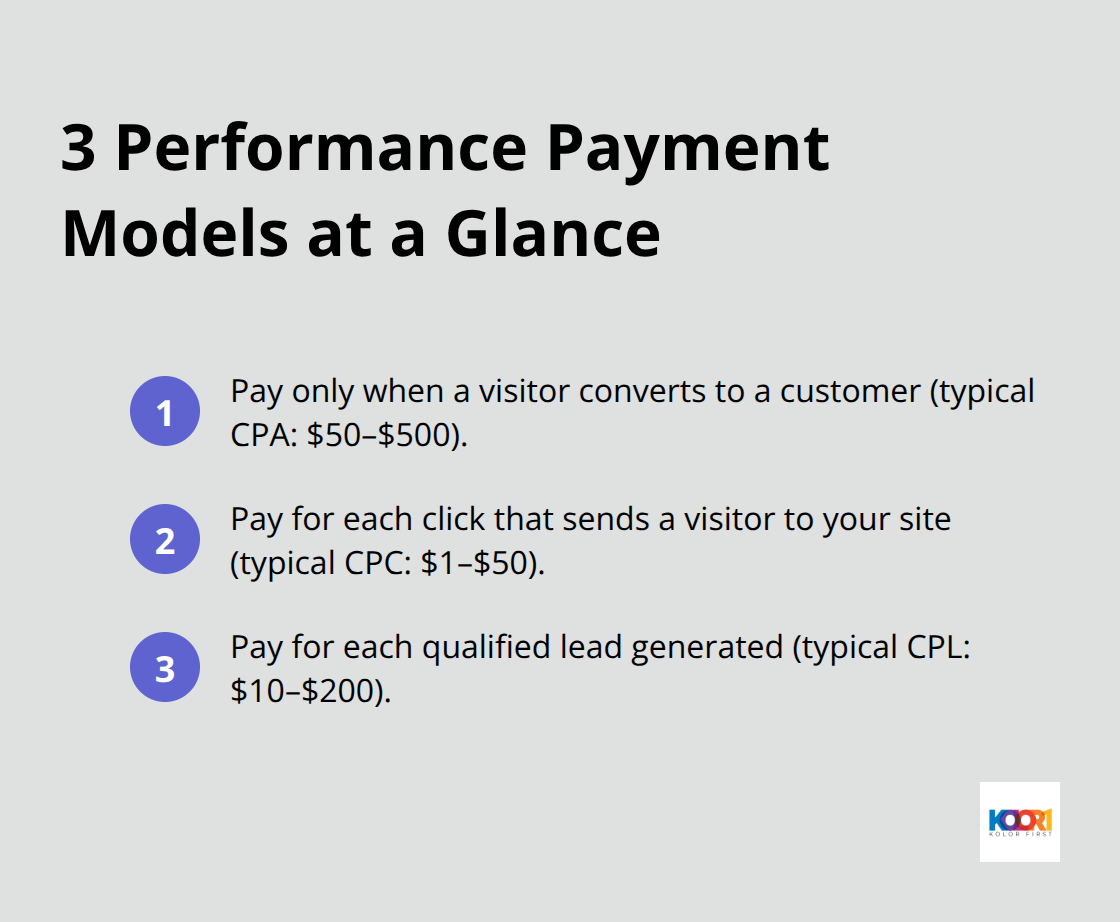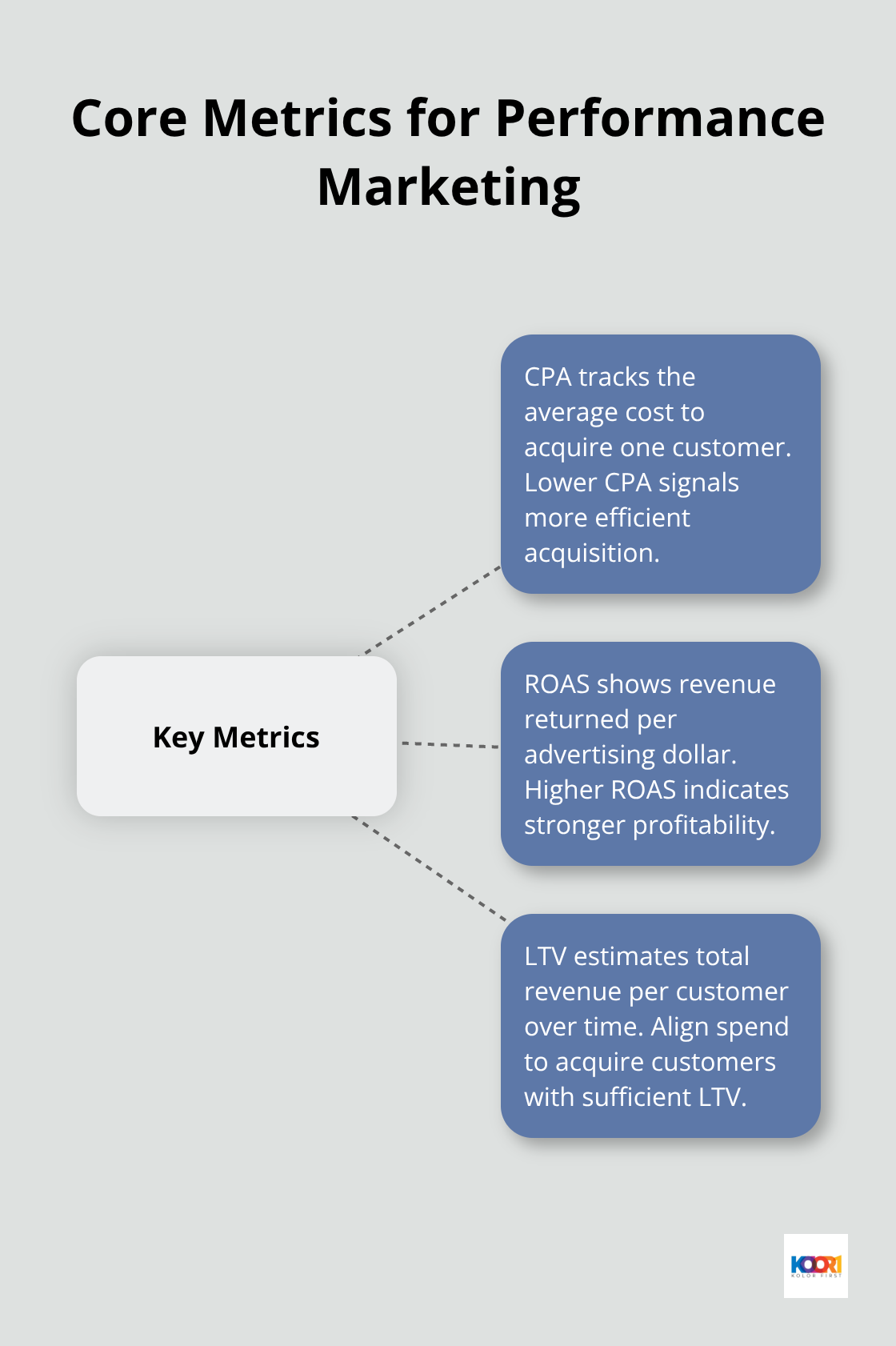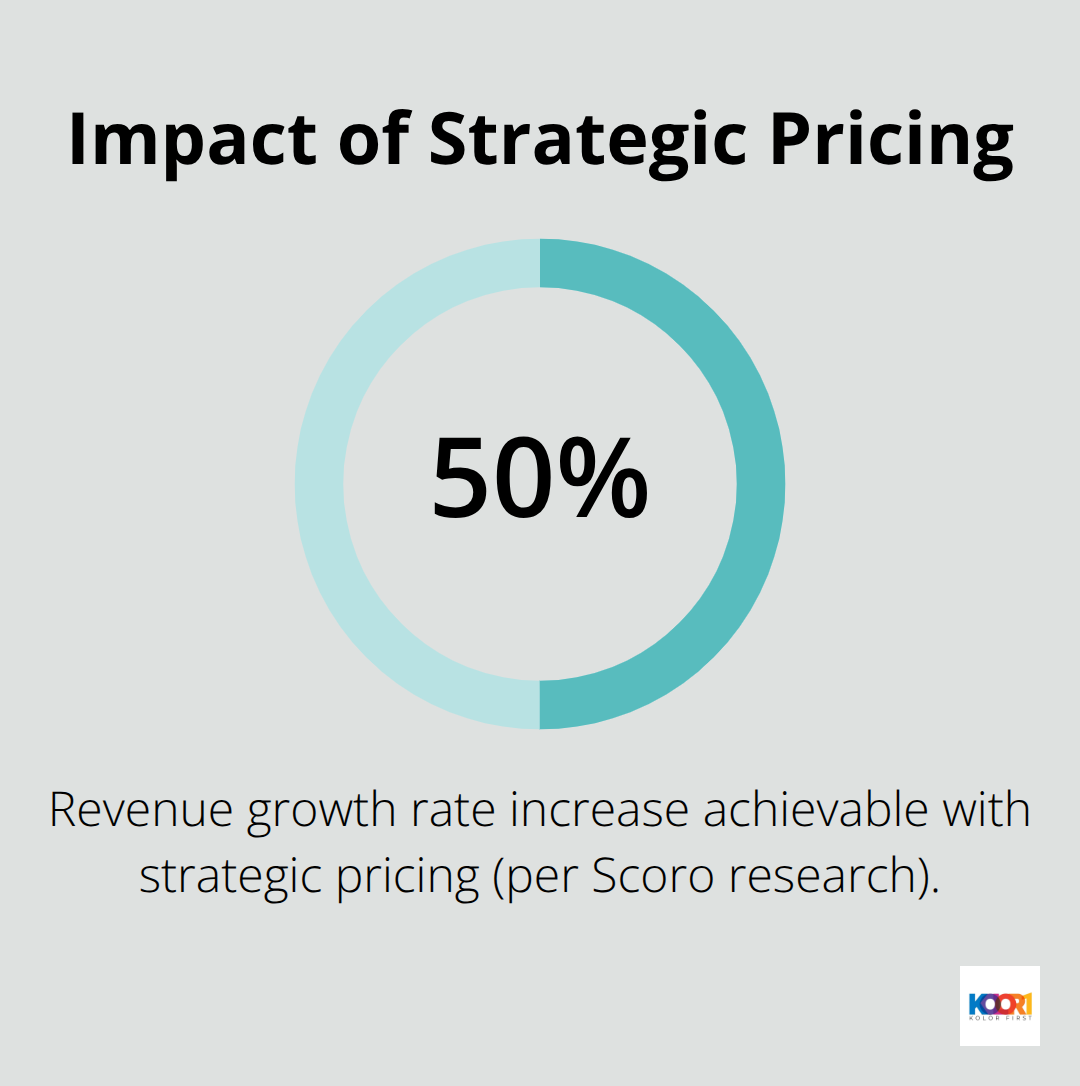Performance-based marketing has transformed how businesses approach advertising spend. Instead of paying upfront fees with uncertain outcomes, companies now pay agencies based on actual results delivered.
We at Kolorfirst LLC see many businesses struggle to find the right performance-based marketing agency. The wrong choice can waste budget and damage growth potential.
This guide reveals what separates top-performing agencies from mediocre ones.
What Is Performance-Based Marketing
Performance-based marketing operates on a simple principle: you pay only when specific actions occur. Unlike traditional models where agencies charge monthly retainers or project fees regardless of results, performance marketing ties compensation directly to measurable outcomes like clicks, leads, or sales. Over 7 million advertisers now use pay-per-click advertising as part of their campaigns, which demonstrates the widespread adoption of results-driven approaches.
Payment Models That Deliver Results
The most effective performance marketing uses three primary payment structures. Cost per acquisition charges you only when someone becomes a customer, typically ranging from $50 to $500 depending on your industry. Cost per click models charge between $1 to $50 per website visitor, while cost per lead structures typically cost $10 to $200 for each qualified prospect.

Email marketing delivers exceptional returns with every dollar spent generating strong profits when campaigns target specific segments. Companies that use affiliate marketing expand their reach through partnerships while they pay only for actual results, which makes budget allocation predictable and risk-free.
Traditional Marketing Creates Misaligned Incentives
Traditional marketing agencies charge fixed monthly fees between $3,000 and $15,000 regardless of campaign performance. This creates misaligned incentives where agencies profit even when your campaigns fail. Performance marketing eliminates this problem because it links agency compensation to your business success. Google regularly updates its algorithm, which makes outdated traditional approaches ineffective. Modern customers consult multiple sources and switch between devices frequently before they purchase, requiring dynamic strategies that traditional fixed-fee models cannot accommodate effectively.
Performance Metrics That Matter Most
Successful performance campaigns focus on metrics that directly impact your bottom line. Cost per acquisition (CPA) measures how much you spend to gain each new customer. Return on ad spend (ROAS) calculates revenue generated for every dollar invested in advertising. Customer lifetime value (LTV) helps determine the long-term profitability of acquired customers.

These metrics provide clear visibility into campaign effectiveness and allow for real-time optimization based on actual performance data. Digital marketing tools help businesses track performance and engage audiences effectively throughout this process.
The next step involves identifying which specific qualities separate exceptional performance-based agencies from mediocre ones.
How Do You Identify the Right Performance Agency
The right performance-based marketing agency demonstrates three essential qualities that distinguish industry leaders from mediocre competitors. Agencies with proven track records in your specific industry deliver better results than generalist firms because they understand market dynamics and customer behavior patterns. Demand to see case studies with actual company names and specific metrics rather than anonymous examples. Top agencies share conversion rate improvements, cost per acquisition reductions, and revenue growth percentages from clients in similar industries. Marketing benchmarks help evaluate performance by comparing key KPIs such as sessions, CTR, conversion rate, and engagement rate across industries. Request references from at least three current clients and contact them directly to verify results claims.
Track Record Validation Reveals True Performance
Exceptional agencies provide detailed case studies that include specific company names, campaign durations, and exact performance metrics. They show before-and-after data with clear attribution to their strategies rather than market conditions or seasonal factors. Industry-specific experience matters because healthcare marketing differs significantly from e-commerce or B2B software campaigns. Agencies should demonstrate success with businesses of similar size and budget range to yours. Request to see at least five case studies from the past 18 months, as older examples may reflect outdated strategies that no longer work effectively.
Transparency Separates Winners from Pretenders
Top-performing agencies provide weekly performance reports with detailed breakdowns of every dollar spent and every action generated. They use professional analytics platforms like Google Analytics and specialized tools to monitor campaign performance in real-time. Monthly reports include specific metrics such as cost per click, conversion rates, return on ad spend, and customer acquisition costs with clear explanations of optimization strategies. Agencies that refuse to share login credentials to advertising platforms or provide vague reporting summaries hide poor performance. The best performers offer custom dashboards where you can view campaign data 24/7 and schedule regular strategy calls to discuss results and upcoming optimizations.
Service Range Determines Long-Term Success
Performance agencies must excel across multiple marketing channels to maximize your results. Look for expertise in paid search, social media advertising, affiliate marketing, email campaigns, and conversion optimization because modern customers interact with brands through an average of 10 different touchpoints before purchase. Agencies that specialize in only one channel limit your growth potential and cannot adapt when platform algorithms change (which happens frequently across all major platforms). Verify their team has certified professionals for each major platform such as Google Ads, Facebook Ads Manager, and affiliate networks. The strongest agencies employ A/B testing strategies across all channels and use data-driven insights to optimize campaigns continuously rather than rely on outdated tactics.
However, even agencies with impressive credentials can hide serious problems that will damage your campaigns and waste your budget.
What Red Flags Should You Avoid
Agencies that promise guaranteed results or unrealistic outcomes reveal their inexperience with performance marketing fundamentals. Legitimate agencies never guarantee specific conversion rates or revenue increases because too many variables affect campaign performance, including market conditions, seasonal trends, and competitor actions. Scoro research shows that agencies with strategic pricing increase revenue growth rates by up to 50%, but this happens through careful optimization rather than overnight transformations.

Agencies that promise to triple your leads within 30 days or guarantee first-page Google rankings operate outside industry best practices and likely use tactics that violate platform policies.
Vague Contracts Hide Poor Performance
Professional performance agencies provide detailed contracts that specify exact metrics, measurement methods, and payment thresholds for each campaign objective. Contracts must define what constitutes a qualified lead, how conversions are tracked, and which attribution models determine results. Agencies that offer vague terms like “improve your marketing effectiveness” or “increase brand awareness” without specific numerical targets avoid accountability for actual performance. The contract should specify report frequency, data access permissions, and termination conditions with clear performance benchmarks. Performance-based pricing models create stronger client relationships, but only when both parties understand exactly what success looks like and how it gets measured.
Communication Problems Predict Campaign Failures
Responsive communication indicates how agencies will handle your campaigns when problems arise or opportunities emerge. Agencies that take more than 24 hours to respond to emails or schedule calls weeks in advance demonstrate poor organizational systems that will negatively impact your campaign management. Professional agencies assign dedicated account managers who provide weekly updates, monthly strategy calls, and immediate responses to urgent issues. They should explain campaign changes in simple terms without technical jargon and provide advance notice before they implement major strategy shifts. Agencies that become difficult to reach after contracts are signed typically struggle with client management and campaign optimization (which directly impacts your marketing results and budget efficiency).
Unrealistic Timeline Expectations Signal Problems
Experienced agencies understand that performance marketing requires time to optimize and deliver sustainable results. Agencies that promise immediate results within the first week ignore the reality that most platforms need 2-4 weeks to gather sufficient data for optimization. Quality lead generation campaigns typically require 30-60 days to establish consistent performance patterns. Agencies that rush implementation without proper testing phases often waste budget on poorly targeted audiences and ineffective ad creative. Professional agencies outline realistic timelines that include testing phases, optimization periods, and expected performance milestones based on industry benchmarks rather than wishful thinking.
Final Thoughts
You must evaluate three essential factors when you select a performance-based marketing agency. Verify the agency shows documented results with businesses similar to yours through specific case studies that include real company names and measurable outcomes. Confirm they provide transparent weekly reports with detailed metrics and offer real-time dashboard access. Validate their expertise across multiple marketing channels that include paid search, social media ads, and conversion optimization.
Ask these questions before you sign any contract: What specific metrics will determine payment thresholds? How do you track and attribute conversions across different channels? What happens if campaigns underperform during the first 60 days (which sometimes occurs during optimization phases)? Can you provide references from three current clients in my industry?
Start your performance marketing journey when you define clear success metrics that align with your business objectives. Set realistic expectations for the first 90 days while your chosen agency optimizes campaigns and gathers performance data. We at Kolorfirst LLC help businesses through our comprehensive digital marketing solutions that focus on measurable growth. The right performance-based marketing agency partnership transforms ad spend into predictable revenue growth when you choose wisely.






